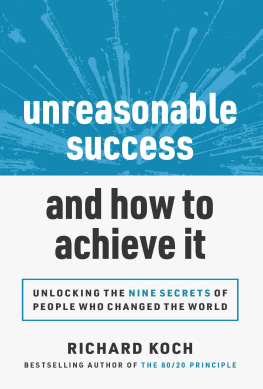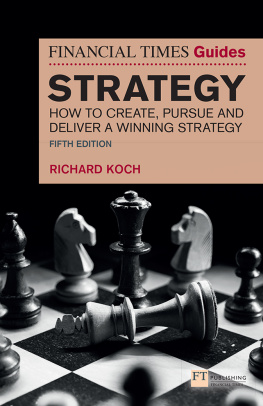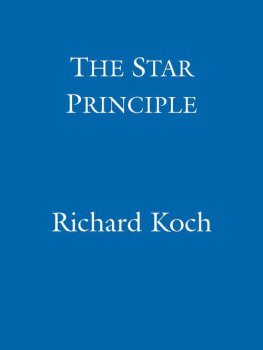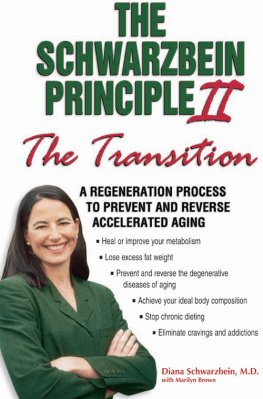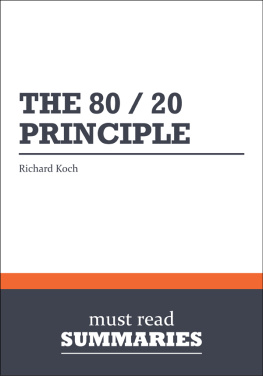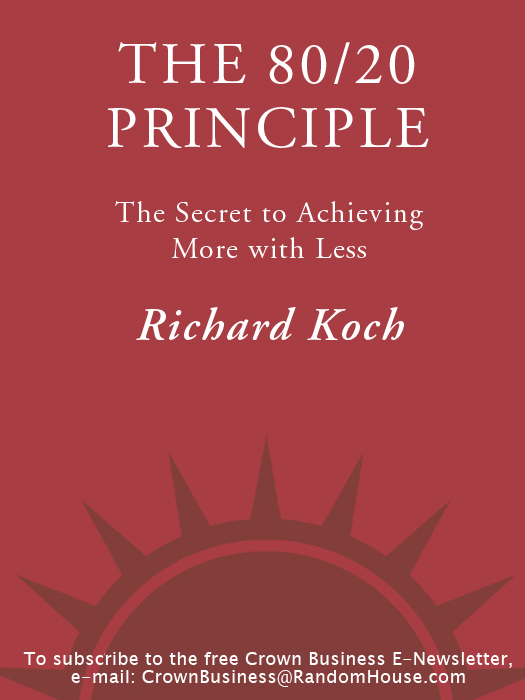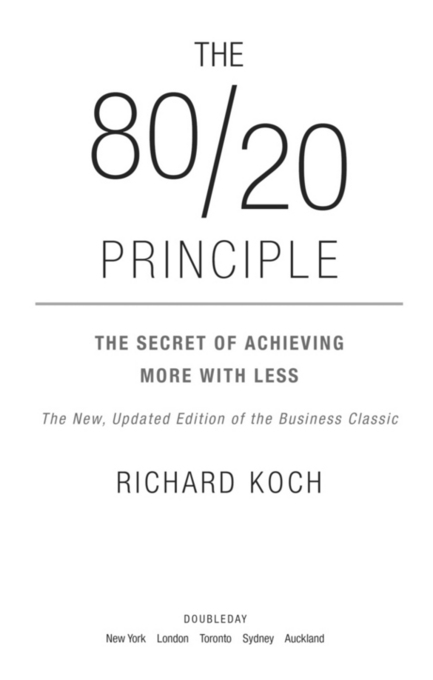Praise for The 80/20 Principle
The 80/20 Principle is the cornerstone of results-based living. Read this book and use it.
Tim Ferriss,
author of The 4-Hour Workweek
Time management is not about organizing your daily tasks, it is about organizing your essential daily tasks, and dumping the rest. Koch has made millions from thisa bestseller based on just one ideaproving that it works.
GQs 25 Best Business Books
The 80/20 Principle is terrific!
Al Ries,
bestselling author of Focus and Positioning
Both astute and entertaining, this is an intriguing book to help people concentrate on not wasting their lives.
Professor Theodore Zeldin,
St. Antonys College, Oxford University
We give this Dali-esque masterwork 5 stars a beautiful collage of well-written prose This book is worth many times its price.
Weston Review, Tampa Bay, Florida

DOUBLEDAY
Although the author expresses a view on the likely future performance of certain investment instruments, this should not be taken as an incitement to deal in any of them, nor is it to be regarded as investment advice. Each individual should consider their investment position in relation to their own circumstances with the benefit of professional advice. No responsibility can be assumed by either the author or the publisher for investment or any other decision taken on the basis of views expressed in this book.
Copyright 1998, 2008 by Richard Koch
All Rights Reserved
Published in the United States by Doubleday,
an imprint of The Doubleday Publishing Group,
a division of Random House, Inc., New York.
www.doubleday.com
Originally published in the U.K. by Nicholas Brealey Publishing. First published in the United States by Currency Doubleday in 1998. This revised and updated edition published by arrangement with Nicholas Brealey Publishing.
DOUBLEDAY is a registered trademark and the DD colophon
is a trademark of Random House, Inc.
Library of Congress Cataloging-in-Publication Data
Koch, Richard, 1950
The 80/20 principle: the secret of achieving more with less /
by Richard Koch.
p. cm.
1. Time management. 2. Labor productivityPsychological aspects.
3. Industrial efficiencyPsychological aspects.
4. Conduct of life. I. Title.
HD69.T54K63 1998
650.1dc21 97-37959
eISBN: 978-0-385-52831-3
v3.1
To Lee
For a very long time, the Pareto law [the 80/20 Principle] has lumbered the economic scene like an erratic block on the landscape: an empirical law which nobody can explain.
J OSEF S TEINDL
God plays dice with the Universe. But theyre loaded dice. And the main objective is to find out by what rules they were loaded and how we can use them for our own ends.
J OSEPH F ORD
We cannot be certain to what height the human species may aspire We may therefore safely acquiesce in the pleasing conclusion that every age of the world has increased, and still increases, the real wealth, the happiness, the knowledge, and perhaps the virtue, of the human race.
E DWARD G IBBON
CONTENTS
PREFACE TO THE SECOND EDITION
I wrote this book in South Africa in 1996, and came to London in the so-called summer of 1997 to launch it. I remember traipsing from radio station to television station, usually to find that my slot had been pulled at the last minute. When I did get on the air, nobody seemed very interested in the findings of an obscure Italian economist in the dying years of the nineteenth century. Oooh, one celebrity of the minute crooned on a talk show, what are you doing here if you didnt come up with this idea yourself? I would like to say that, without missing a beat, I mentioned the influence of Saint Paul and the gospel writers in doing the heavy lifting for the ideas of one Jesus of Nazareth, who would otherwise have been unknown. I would like to say that, but in fact I was lost for words.
I returned to Cape Town, thoroughly dejected. And then, a minor miracle. The British publisher who had commissioned the work, a man well known for looking on the gloomy side, faxed me (remember faxes?) to say that despite the PR fiasco, the book was selling very well. In fact, the book has sold more than 700,000 copies worldwide and been translated into twenty-four languages.
More than a century since Vilfredo Pareto noted the consistently lopsided relationship between inputs and outputs, and a decade since this book reinterpreted Paretos principle, I think we can now say that the principle has stood the test of time. There has been massive feedback, mainly positive, from readers and reviewers. Throughout the world, a large number of individuals, perhaps hundreds of thousands, have found the principle useful, at work and in their careers, and increasingly in the whole of their lives.
The 80/20 Principle has two almost opposite appeals. On the one hand, it is a statistical observation, a proven patternsolid, quantitative, reliable, hard. It pleases those who want to get more out of life, to get ahead of the crowd, to increase profits or decrease effort or costs in the pursuit of gain, to dramatically raise efficiency, defined as output divided by input. If we can spot the few cases where the results relative to effort are so much greater than usual, we can become so much more efficient in whatever task we want to accomplish. The principle allows us to enhance our achievement while escaping the tyranny of overwork.
On the other hand, the principle has a totally different sidesoft, mystical, eerie, almost magic in the way that the same pattern of numbers crops up everywhere, and related not to efficiency at all but to everything that makes our lives worthwhile. The sense that we are connected to each other and to the universe by a mysterious law, which we can tap into and which can change our lives, generates a sense of wonder and awe.
Looking back, I think what was different about my book was that it extended the domain of the principle. It had previously been well known in the business arena to increase efficiency. As far as I know, it had never previously been deployed to enhance the quality and depth of our whole lives. Its only in retrospect that I have fully realized the dual nature of the principle, the curious but perfect tension between its two sides, hard efficiency and soft life enhancement. As I explore in the new chapter of the book, this tension represents the yin and yang of the principle, the dialectic, where efficiency and life-enhancing uses of it are complementary opposites. Efficiency clears the space for life enhancement, while life enhancement requires us to be clear about the few things that are really important in our work, relationships, and all the other activities we do in our lives.
Of course, not everyone accepted my reinterpretation of Paretos principle. I was surprised at how controversial the book became. While it had its fierce supporters, and a huge number of quiet people who wrote to me saying the book had changed both their professional life and their life as a whole, there were many people who disliked the extension of the principle to the softer side of life, and said so with great clarity and eloquence! The opposition took me aback, but then I came to welcome the contrary voices. They have made me think about the principle more deeply and, as I hope is demonstrated in the final chapter, reach a greater understanding of its dual nature.


